Traditional luxury cars: The decline of aristocracy | JVs in a rush
![]() 03/19 2025
03/19 2025
![]() 579
579
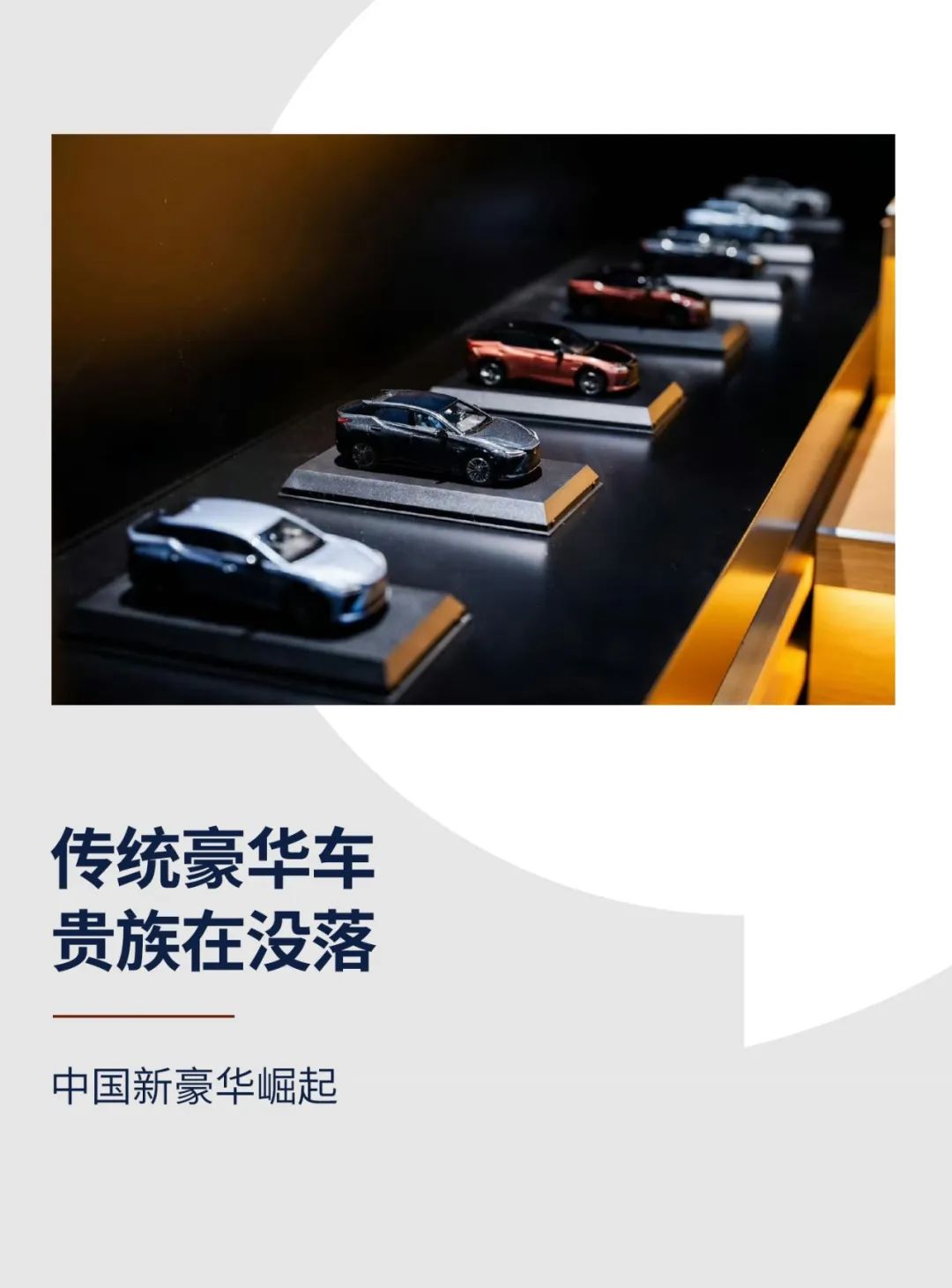
Author | Shen Tianxiang
Editor | Li GuozhengProduced by | Bangning Studio (gbngzs)
Since March this year, joint venture auto brands have launched an intensive new car offensive, showing the market their determination to counterattack. Especially when GAC Toyota Bozhi 3X equipped its 150,000 yuan model with lidar, the effect was very obvious - within one hour of its launch, orders exceeded 10,000, making it a rare hit for joint venture vehicles in the new energy era.
But it was quickly suppressed - a few days later, Chinese new energy vehicle brand Leaping Auto threw a bombshell: the Leaping B10 also comes with lidar, and its price has dropped to 129,800 yuan. Within one hour of announcing the price, orders exceeded 15,000, and within 48 hours, it exceeded 31,000.
In the mid-to-low-end market, Chinese brands frequently initiate price wars and specification wars, forcing joint venture brands to retreat step by step. According to data from the China Association of Automobile Manufacturers, the sales share of Chinese brand passenger vehicles was 65.2% last year; it rose to 70.6% in February this year, an increase of 11.2% compared to the same period last year.
How is the competition between Chinese and foreign brands in the luxury car market on the other end of the spectrum?
In early February this year, Toyota China officially announced the localization of Lexus, with plans to build a wholly-owned factory in Shanghai to produce pure electric vehicles and establish a battery R&D and production company, with a planned production capacity of 100,000 vehicles per year starting in 2027.
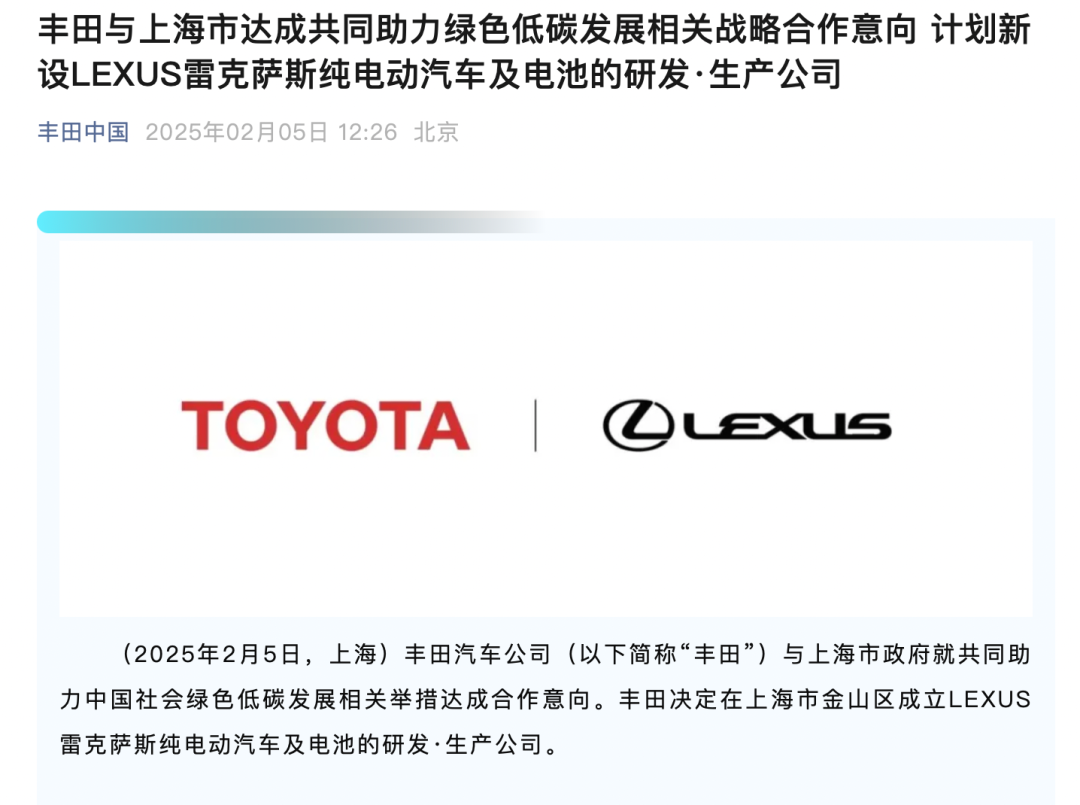
At the beginning of March, Genesis China CEO Zhu Jiang revealed during a media communication meeting that within the next 3 to 5 years, Genesis plans to launch locally developed and manufactured new energy products to the market. The new cars will fully integrate the needs of the Chinese market and may also be sold globally.
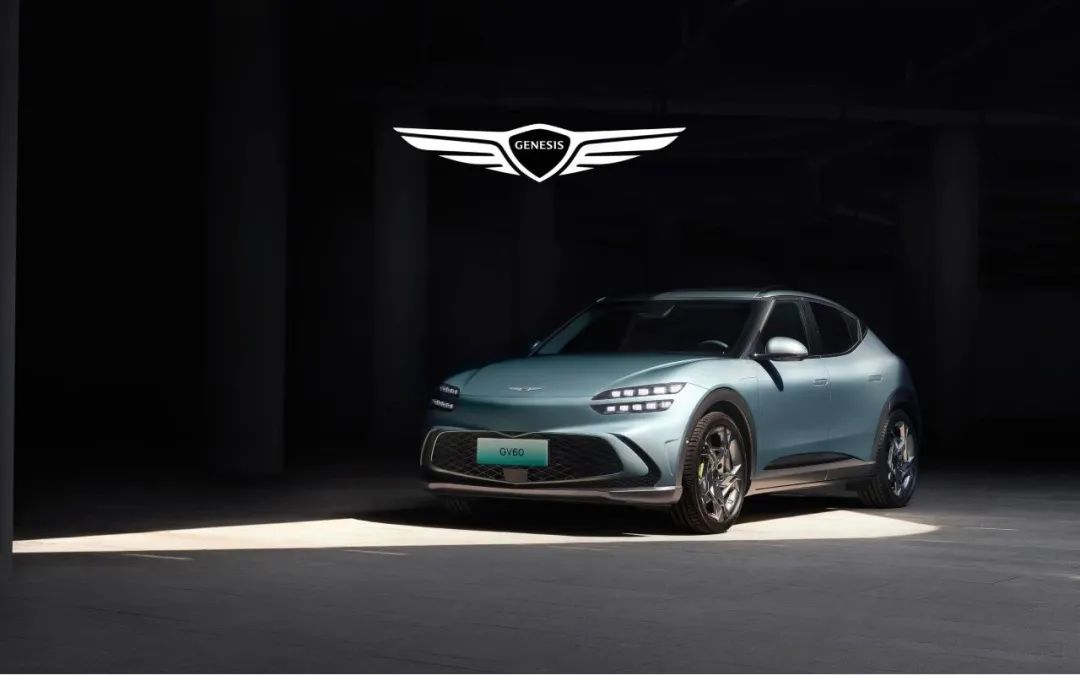
Currently, Lexus has reached a cooperation intent with the Shanghai Municipal Government; Genesis' localization is still in the concept and planning stage, and due to its market size and market attention, the news has not caused much stir.
Can the traditional luxury car camp, represented by BBA and Lexus, withstand the attack of China's new luxury auto brands? Can they defend the last stronghold of multinational automotive companies in China?
Competition for Entry Tickets
Lexus and Genesis accelerating localization is a strategic self-rescue by traditional luxury brands in response to the dramatic changes in the Chinese market, aiming to compete for entry tickets in the era of new energy intelligence.
In the past, China's luxury car market was often divided into first-tier luxury represented by BBA and second-tier luxury represented by Lexus, Cadillac, Volvo, Lincoln, Jaguar Land Rover, Infiniti, Acura, Genesis, etc. Currently, except for Lexus and Genesis, all others have been localized.
In recent years, China's luxury car market has undergone dramatic changes. Although BBA's sales are still strong and stable in the first tier, their share of the luxury market has dropped from 75% in 2020 to 68% in 2024. Starting last year, BBA channels also engaged in price wars, and although the automakers intentionally controlled them, dealers had to reduce prices to survive.
The outlook for second-tier luxury brands is generally even more bleak, with their share dropping from 17% in 2020 to 12% in 2024. The main contributors to this share are Lexus, Volvo, and Cadillac, each with annual sales exceeding 100,000 vehicles. Among them, Lexus has always been the leading player in the second-tier luxury camp, with sales of 181,900 vehicles in 2024.
Lincoln and Jaguar Land Rover have declined severely. There are also brands that have gradually disappeared from the public eye - the upcoming locally produced Genesis is one of them, with total sales of only 4,374 vehicles in the past three years.
Sang Zhiwei, a member of the expert panel of the China Automobile Dealers Association, analyzed that in 2024, luxury car sales reached 3.45 million, a year-on-year decline of 7.8%; market share was 14.6%, a decrease of 2.9% compared to the same period last year. Among them, sales of traditional luxury brands (excluding Tesla) were 2.79 million, a year-on-year decline of 11%.
From the terminal perspective, there have been constant farces, with most luxury brands reducing the number of networks and optimizing dealer assets. Their dealers have shifted from "oil" to "electricity" and have embraced Chinese luxury brands such as HarmonyOS Intelligent Driving.
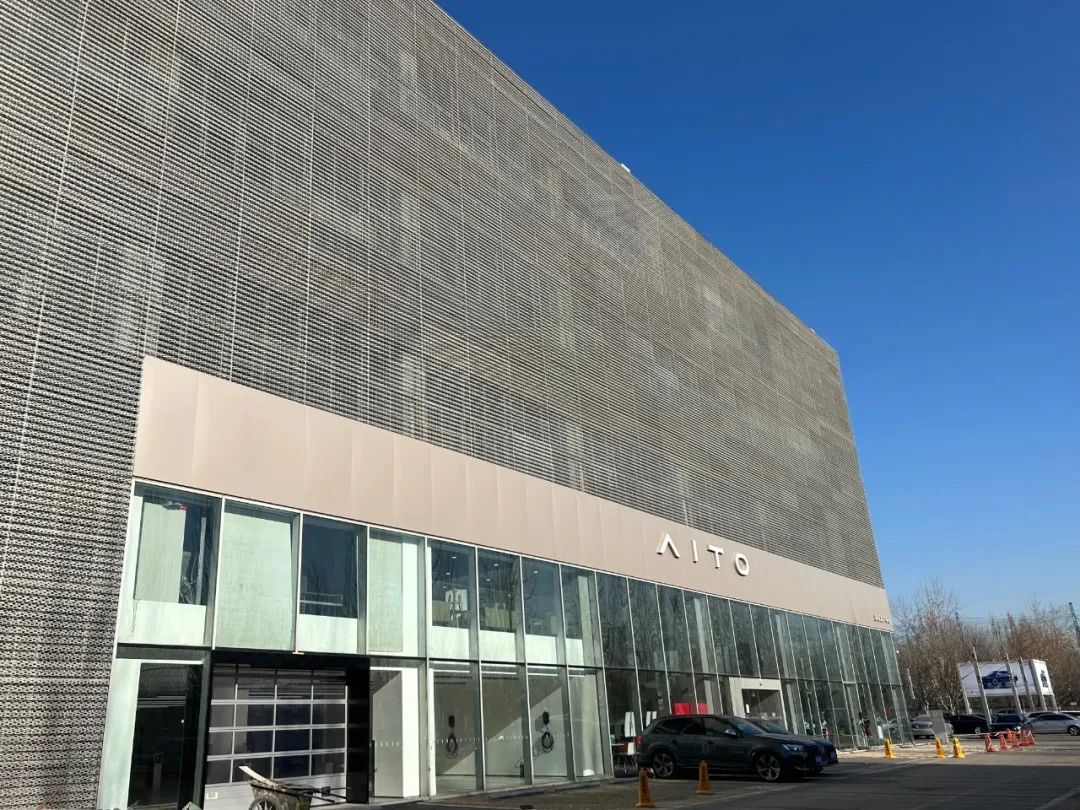
Like mid-to-low-end brands, traditional luxury brands also need to transform, with the direction being new energy and intelligence.
Traditional luxury car brands that have already been localized all have corresponding layouts in the Chinese market, and some have established a full-chain system integrating R&D, supply chain, power batteries, and electric vehicle production.
Recently, BMW Group announced that the first batch of new-generation locally produced test vehicles rolled off the production line in Shenyang, initiating rigorous testing and validation. In 2026, its new-generation models will begin mass production in China. At the same time, it has established three major software companies in China - Lingyue Beijing, BMW Chengmai, and Lingyue Nanjing - to build a strong innovation system and cooperate with Chinese technology companies.
On March 17, BMW China and Huawei Terminal announced that they have reached a cooperation agreement: BMW will deeply integrate with the HarmonyOS ecosystem in China and launch digital services including BMW Digital Key, HUAWEI HiCar, and MyBMW App. Based on HarmonyOS NEXT, it will develop diversified and intelligent applications and functions, focusing on high-frequency scenario needs, to create a seamless and intelligent experience across scenarios for Huawei HarmonyOS users.
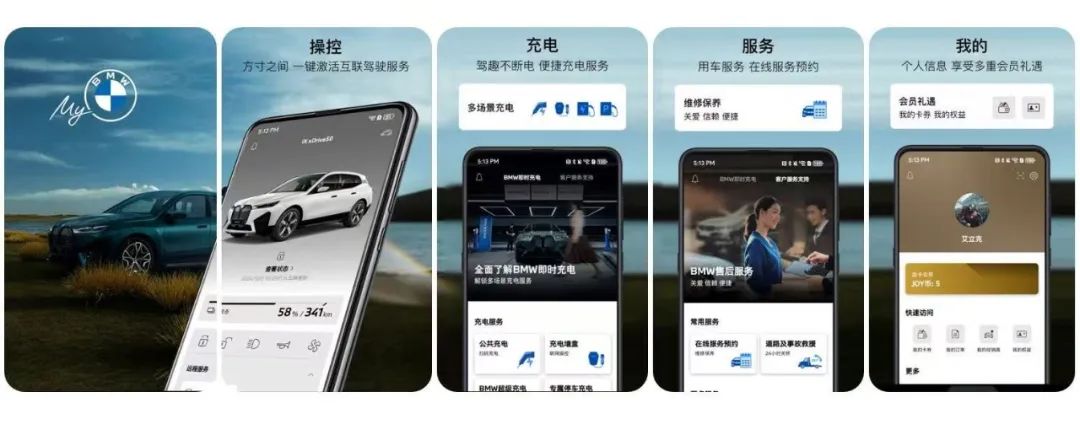
On the Audi side, it is making dual-track arrangements through FAW-Audi and SAIC-Audi. On the one hand, the FAW-Audi New Energy Automobile Co., Ltd. in Changchun started production last year, becoming Audi's first pure electric vehicle production base in China based on the PPE platform. On the other hand, based on the intelligent digital platform jointly developed with SAIC Motor, it launched the new electric brand "AUDI".
Starting from 2025, Mercedes-Benz will bring a new generation of pure electric vehicle products to China and locally produce high-end models such as the new-generation GLE at Beijing Benz, focusing on intelligent and electric development. At the same time, it will invest more than 14 billion yuan in China to bring a series of localized strategic products centered around electrification, intelligence, and high-end.
Whether they are first-tier or second-tier, including the upcoming locally produced Lexus and Genesis, there are three major advantages to localizing luxury cars at this time.
First, China has the world's most complete new energy vehicle industrial chain and is at the forefront of the development of intelligent technology, enabling more efficient access to raw materials and components, reducing procurement and logistics costs, and also facilitating technological exchanges and cooperation.
Second, China has a huge market size and the fastest iteration speed, with consumers having a higher acceptance of automotive intelligence and new technologies, providing a naturally good soil for the research and development and iterative upgrading of electric vehicles.
Third, China has now become the world's largest exporter, with not only low supply chain costs but also low human resource costs, logistics, and other comprehensive costs conducive to exports, which is conducive to building a strategic hub of "Made in China, feeding back to the world," as evidenced by Tesla.
Objectively speaking, compared to Lexus, the success rate of Genesis localization is much lower, and even many people believe it is doomed to fail.
The share of Korean cars in China's new car market is already very small, at only 1.6% in 2024. Moreover, Genesis entered the Chinese market relatively late and has low market awareness, making it difficult to establish trust with consumers.
Challenging New Luxury
After securing entry tickets in the era of new energy intelligence, the more challenging task is to grasp the definition of new luxury.
On the one hand, traditional luxury brands are actively transforming, attempting to continue to grasp the definition of new luxury by leveraging their brand history and manufacturing experience, as well as continuously launching new energy and intelligent products. On the other hand, China's new luxury brands are competing for the definition of new luxury through technological innovation.
But ultimately, it is the consumers who vote, and their needs and preferences will determine the definition of new luxury.
When discussing new luxury now, two brands cannot be avoided: one is HarmonyOS Intelligent Driving led by Huawei, and the other is "King of Traffic" Xiaomi Cars.
With Huawei signing a contract with SAIC to build the "Shangjie", the "Jie generation" of HarmonyOS Intelligent Driving has now expanded to five. According to the industry-recognized definition of luxury cars costing more than 300,000 yuan, all four currently launched "Jie" have products within the luxury category.
Among them, the main products, such as the Wenjie New M7 and M9, have leveraged the domestic luxury car market. The M7 delivered nearly 200,000 vehicles cumulatively last year, ranking first in sales among Chinese new force models in the 300,000 yuan category. Since its launch, the M9 has consistently ranked first in monthly sales of luxury vehicles in the 500,000 yuan category in the Chinese market.
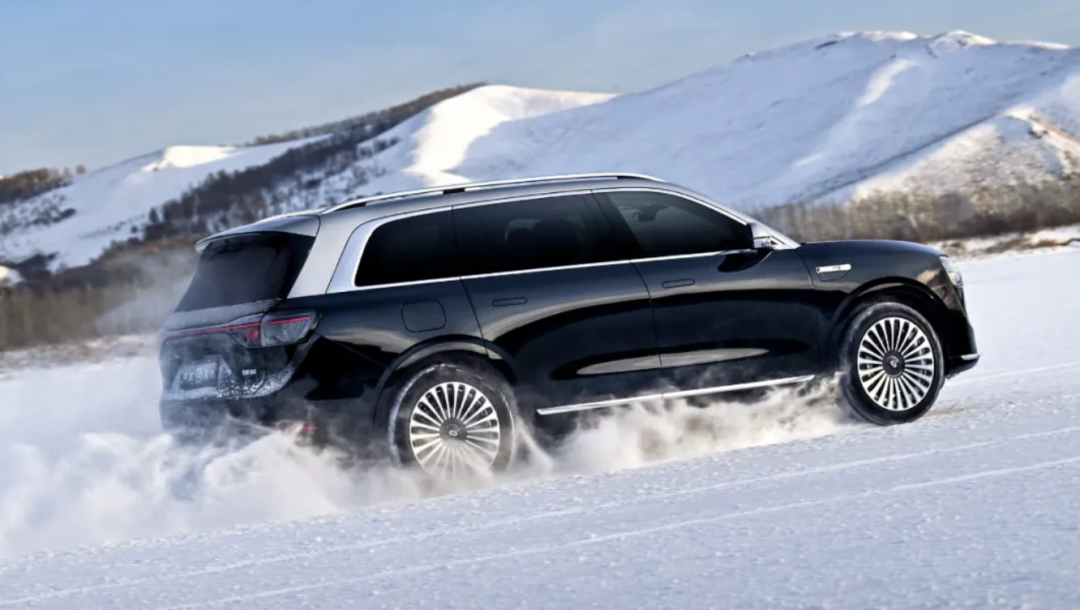
Recently, pre-orders for three new models - the Wenjie New M5 Ultra, M8, and 2025 M9 - have been successively opened. Among them, within 84 hours of the pre-order channel opening, M9 orders exceeded 23,000, while M8 orders exceeded 47,000, making it a "luxury hit maker".
Xiaomi is also hot. Not long ago, after the Xiaomi SU7 Ultra, with a starting price of 529,900 yuan, went on pre-sale, it received over 6,900 "big orders" within 10 minutes and over 10,000 within 2 hours; within less than 3 days, "big orders" reached 19,000.
What is a new luxury car? In Xiaomi's view, it is one that rivals Porsche in performance, Tesla in technology, and BBA in luxury, leading in all aspects such as design, technology, and sports. Judging from consumers' enthusiasm for purchasing, it seems they also recognize this definition.
Sales data for luxury brands in the Chinese auto market shows that in 2024, Mercedes-Benz was still ranked first, followed by BMW, Tesla in third place, and Audi in fourth. Following them are three Chinese brands: Li Auto, Wenjie, and NIO. Then come Lexus, Volvo, and Cadillac.
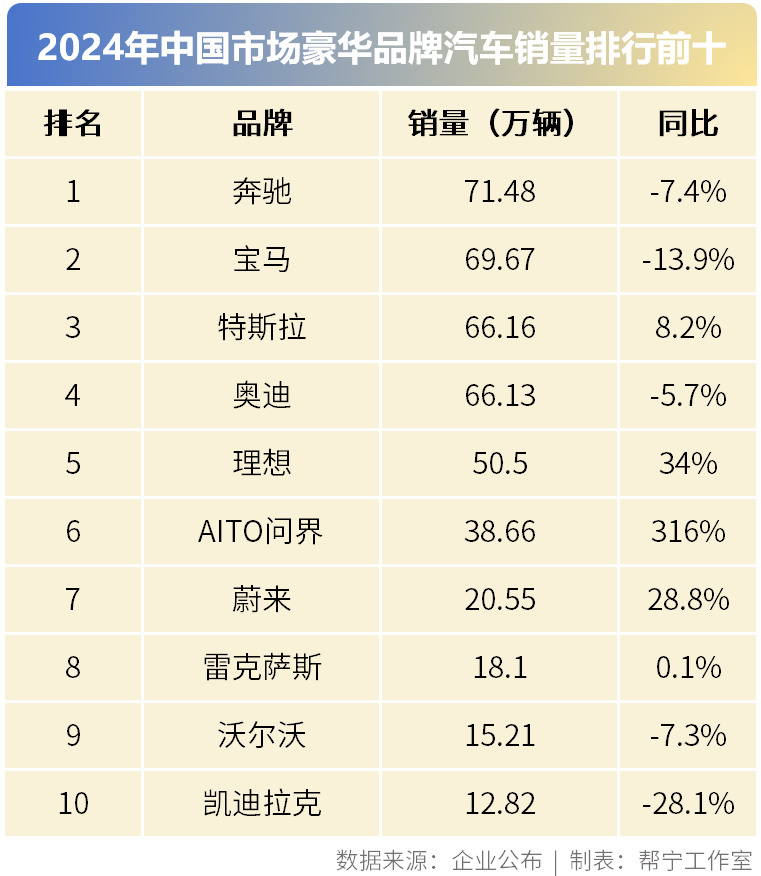
According to the "2024 McKinsey China Automotive Consumer Insights", domestic consumers' willingness to pay a premium for foreign brands is decreasing. Chinese high-end new energy vehicle brands have successfully won the favor of consumers with their leading technological advantages in intelligence and other areas. Owners of traditional foreign high-end brands are shifting to Chinese high-end new energy vehicle brands in the form of a nearly "one-way flow".
The rise of China's new luxury brands reflects the diversification and upgrading trend of consumer demand for automotive products. They are no longer solely pursuing the aura of traditional luxury brands but are paying more attention to aspects such as the technological content, performance, personalized configuration, and service experience of products.
This indicates that the Chinese auto market is gradually maturing, and consumers are becoming more rational and independent when purchasing cars, willing to pay for high-quality, innovative local luxury brands.
This brings enormous competitive pressure to traditional luxury brands, forcing them to accelerate their pace of innovation.
To defend their last stronghold, traditional luxury brands should rethink the definition of luxury.
In terms of products, they should accelerate technological innovation and transformation, especially being more aggressive in the field of intelligence. In terms of branding, they should tell new stories rather than just talking about sentiment and history. In terms of experience, they should provide users with more differentiated services.
Of course, "China's new aristocracy" cannot ignore the product power and brand appeal of traditional luxury brands. Perhaps the final outcome of this battle will be similar to that of the smartphone industry between Apple and Huawei - not absolute replacement, but continuous competition and cooperation.
What is certain is that any brand that clings to the old paradigm of "history equals luxury" will be swept into the dust of history. Those who will hold the discourse power will be brands that are user-centric and continuously reconstruct value through technological innovation.
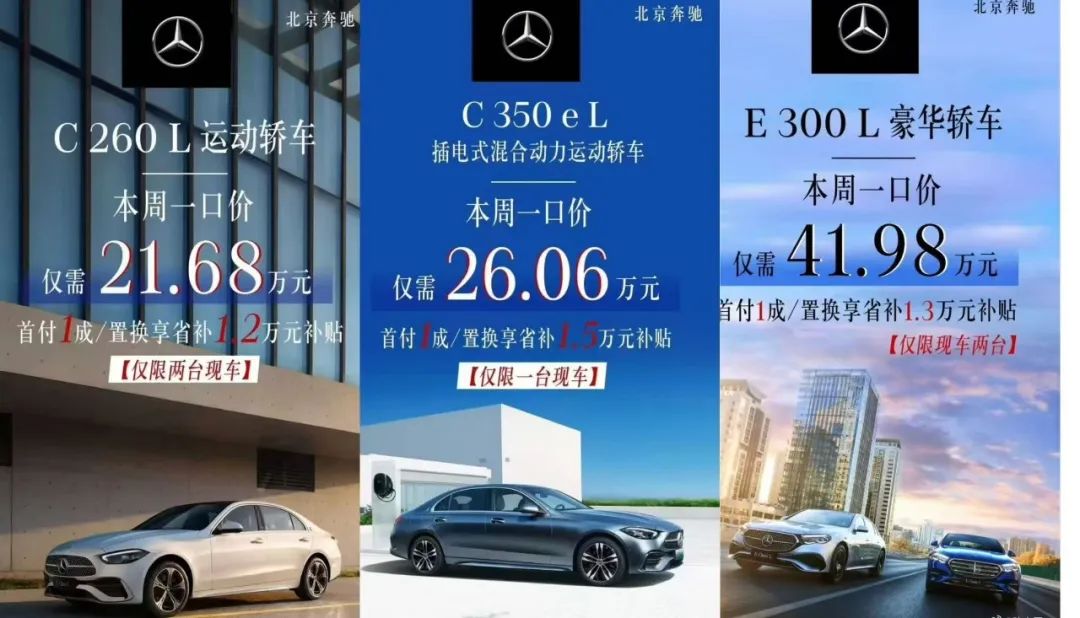
Recently, a Mercedes-Benz dealer released several "fixed price" posters - "E300L for only 419,800 yuan", "C300eL for only 260,600 yuan", and "C260L for only 216,800 yuan". Although the BBA automakers have not officially implemented "fixed prices", their dealers have taken action due to operational pressure.
The chill is sweeping through the traditional luxury car market, and the last aristocracy of automobiles is declining.







